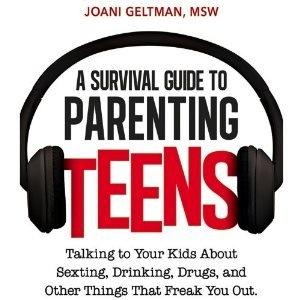Keeping Teens and Tweens Safe
- Wednesday, 13 May 2015 12:11
- Last Updated: Wednesday, 13 May 2015 15:38
- Published: Wednesday, 13 May 2015 12:11
- Hits: 6816
 William Galvin said, "Mother Nature is providential. She gives us 12 years to develop a love for our children before turning them into teenagers." That was the topic of the discussion on Thursday, May 7th at the Scarsdale Middle School PTA where author and parenting expert Joani Geltman, MSW discussed parent and teen relationships. She has been in practice for 30 years and recently published a book for parents of teens called A Survival Guide to Parenting Teens: Talking to Your Kids About Sexting, Drinking, Drugs, and Other Things That Freak You Out. Ms. Geltman kept the audience highly engaged by focusing on the following topics:
William Galvin said, "Mother Nature is providential. She gives us 12 years to develop a love for our children before turning them into teenagers." That was the topic of the discussion on Thursday, May 7th at the Scarsdale Middle School PTA where author and parenting expert Joani Geltman, MSW discussed parent and teen relationships. She has been in practice for 30 years and recently published a book for parents of teens called A Survival Guide to Parenting Teens: Talking to Your Kids About Sexting, Drinking, Drugs, and Other Things That Freak You Out. Ms. Geltman kept the audience highly engaged by focusing on the following topics:
• The development of the emotional brain vs. the thinking brain (and teen drama)
• Smartphones, texting, dangerous apps for teens, and how to stay on top of it as a parent
• Becoming increasingly self-conscious and sexual development
The battle between the feeling brain versus the thinking brain and teen drama
Ms. Geltman talked about a study that compared the teenage brain to the adult brain with the hypothesis that their brains behave the same way emotionally. Slides of human faces were shown with various emotions. "The frontal cortex, or the thinking part of the brain was activated in adults," Ms. Geltman reported. "However the amygdala, or the feeling part of the brain, was activated in teens." She discussed how this may contribute to what makes the teen-parent relationship challenging. "You are living in a different brain than your teen, literally," she said. "Teens live more in the moment and are more emotional because of this...teen drama anyone?" Teenagers are on a journey of self-discovery. They need to learn by trial and error and parents need to let them learn. "Sometimes just saying 'I get it' is better than lecturing your teen," she suggested. "Acknowledge their pain, but don't minimize or exaggerate it. Don't tell them what to do- kids need to learn how to cope." She talked about how sometimes things that seem inconsequential to us, both positive and negative, feel like the best or worst things ever for a teen. "Teens get caught up in moments and you may not always find what your teen is doing to be likeable," Ms. Geltman said. "Teach them core values and trust them to eventually learn how to make the right choices. "
Smartphones, group texts, dangerous apps for teens, and how to stay on top of it as a parent
Social media, smart phones, and apps now play a role in our child's development whether we like it or not. By sixth grade, most kids have phones and from a social and safety stand point, Geltman thinks they should. However, she warned, "...smartphones are the new binkie. Kids get easily addicted (as do adults) and they're a total time suck. I've never seen so many kids with anxiety and depression and I think these phones are partly to blame for that." She recommends involving kids in the process of setting limits on phone use; for example, saying something to the effect of, I get how important the phone is to you to keep in touch with your friends. But let's figure out a reasonable amount of time for you to be on it. 
Geltman also recommended having knowledge about what is on your teen's phone and computer to protect them from potential harm. "You absolutely need to understand apps including their icons," Ms. Geltman cautioned. "Ask your kids to explain what the app does and why they need it. Apps can be very dangerous and parents should have oversight. To do this on your teen's smartphone, go into settings, general, restrictions and then you can require that a password needs to be entered by you in order to download an app."
Why can apps be dangerous?
Yik yak and Snapchat are all about secrecy and there is no reason these apps should be used by your teenager. Ms. Geltman recommends allowing the use of Twitter or Instagram instead. "Make your kid convince you why they need the app. Snapchat texts disappear right after you read them," she warned, "so monitoring this is impossible." Group texts can also be harmful because they can become a form of peer pressure. Ms. Geltman suggests advising your children to back themselves out of the group text if it seems inappropriate and also letting your kids know that you've heard stories of people taking screen shots of group texts. Oovoo is a new video form of group texting that requires a person be included but can also allow the initiator to then exclude the person from participating. Instagram is okay, according to Ms. Geltman, but KIK (another side to Instagram) is not. For instance, if a camp friend posts pictures, a friend of a friend can see them and another person with KIK can connect with you privately. Therefore, this is not recommended for teens. "Facebook Messenger" is a popular way for teens to connect. "You may not see a lot on their Facebook walls but if you click on messenger, you'll see a lot more of what's going on," she said. YouNow, Meekat, and Periscope are live stream video apps and are dangerous for obvious reasons. YouNow even lets people all over the world buy "fan points" earning money for the person who is live streaming the video.
Geltman summed up by urging parents, "...know your teen's phone, limit the number of apps downloaded, don't allow cell phones in bedrooms, require at least two hours cell phone free a night (even if homework is done), don't allow cell phone service at school even if it's off, and monitor it periodically."
Becoming increasingly self-conscious and developing sexually
Geltman also talked about the imaginary audiences of teenagers. "They're hyper self-conscious," she said. "For example, in elementary school kids measure themselves against other kids in a competitive way, such as comparing spelling test scores. But in middle school, it becomes 'I got the best score on the spelling test and everyone thinks I'm so smart/such a nerd.' Teens and tweens think that everyone has a thought about them." This causes a lot of angst for teenagers and social media doesn't help at all. Teens also begin to pursue attention. "They may discover what it's like to feel sexy," Ms. Geltman said, "I have news for you parents. You may not want to hear it or admit it but this is normal! Denial or judgment will just push them away." She suggested trying to relate to your teen by making up examples of relationship stories, and asking your teen what they would do in a hypothetical situation rather than saying "you better not or you're not allowed," as these strategies will backfire. You can also use movies, or TV shows as examples: "Once I heard a story that a bunch of boys were trying to get some girls to take their clothes off and one girl just pretended she was sick and went home. "Kids aren't usually bad kids," Geltman added. "They're just consumed with themselves and how to fit in. Monitor your kids, educate them without telling them what to do, and talk to them. Do these things and you will have succeeded as a parent."
You can learn more from Ms. Geltman about parenting your teenager by reading her blog, following her on Twitter, or ordering her book. She also loves running "Ask the Expert" parties where groups of parents book her to discuss better managing teens.






